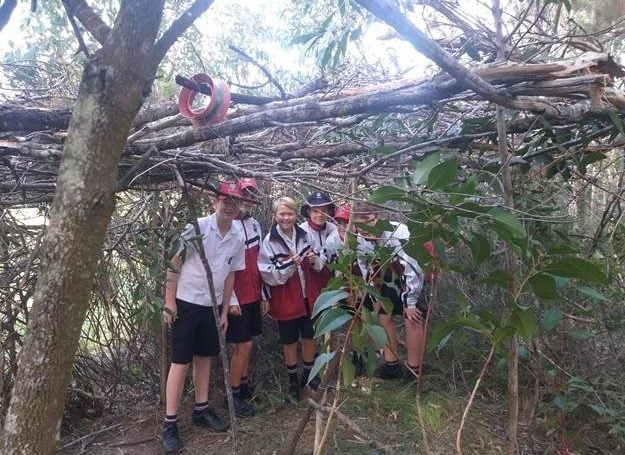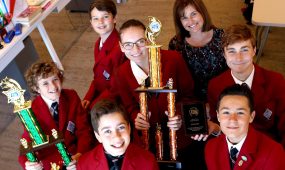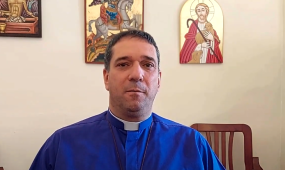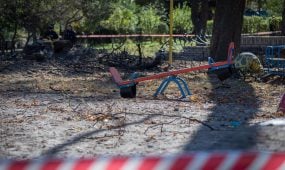‘Bush Boys’ incorporate outdoor activities with learning
News
They have been affectionately nicknamed the ‘Bush Boys’ – they are cheeky, full of personality, adventurous, clever, passionate and well intentioned, mixed together with a slight hint of rebellion

They have been affectionately nicknamed the ‘Bush Boys’ – they are cheeky, full of personality, adventurous, clever, passionate and well intentioned, mixed together with a slight hint of rebellion.
They are a group of Year 8 boys at St Andrew’s Anglican College, who finally found a way to divert their energy during break times.
Using equipment brought in from home, the boys removed broken branches and cleared an area to build a giant secret cubby in an area of bushland surrounding the College.
Their elaborate plan came a to halt, however, when a facilities staff member came across their secret construction, which was in an unsupervised area of the College.
Instead of reprimanding the group of boys, staff at St Andrew’s recognised their ingenuity, imagination, and creativity and took the opportunity to problem solve and work with the students to explore new possibilities and ideas.
The students were tasked to come up with a solution to the problem, which they ‘pitched’ to Principal Chris Ivey and a group of staff with a plan as to why and how they could continue their bush play.
They researched a range of kindergartens, primary schools, and P-12 schools that have unscripted play areas in the bush, as well as the increased benefits of this type of play which includes mental health, self-awareness and an appreciation of the land.
“Our hut was fun, innovative, creative, and was the reason we came to school – outside of learning,” Year 8 student Jarvis said.
“We were only working on the treehouse for just under a week and we felt like that improved our approach towards school.
Advertisement
“We felt like we had changed as people from a couple of weeks ago, getting kicked out of the Hub (library) to now doing something that a lot of teachers think is amazing and is keeping us out of trouble.
“We love our space to just have fun and we would like you to dream with us.”
As a result, Mr Ivey agreed to ‘dream with the students,’ with a trial run for the last two weeks of term. The boys were assigned an area within supervision boundaries and helped develop a set of expectations around safety and respect for the land.
Head of Year 8 Miss Kerrie Dendle said she was extremely proud of the students and their initiative and passion to achieve something they had worked hard for.
“It was a pretty impressive presentation for a group of 12- to 13-year-old boys,” Miss Dendle said.
“It is amazing what can be achieved when they are truly passionate about something.
“These students had previously been the ones who get restless when cooped up – in our conversations, it was common that they had nothing to do that interested them, and no space that they could claim as their own – but this group came up with a plan.
Advertisement
“When first told about it, I thought it was brilliant! They had finally gone and thought of something they could do. Unfortunately, I didn’t communicate this idea very well. But I had some lunchtime meetings with them and heard their thoughts and tried to coach them into being proactive instead of reactive to the decision of banning them from the bush.
“Activities like this are such wonderful resilience-building opportunities and chances to problem solve creatively on the fly as challenges arise.
“I am passionate about encouraging play, developing friendships, resilience, and some independence. It will be interesting to see how it goes.”
Deputy Principal and Head of Secondary Mr Brad Bowen said this was an excellent example of staff building relationships and developing standards to engender student empowerment, rather than relying on rules as a method to control student behaviour.
“Great schools who are willing to work on developing students and not just controlling them understand that to allow students to achieve their personal best, a positive relationship must exist between students and teachers,” Mr Bowen said.
Related Story
 News
News
St Andrew’s Anglican College students win international problem solving competition
“Rules are not effective in teaching moral development, and when a student does not follow school rules, the tendency is to think in negative terms and students do not learn to self-regulate or maintain self-discipline.
“At St Andrew’s we aim to focus on mutually agreed expectations and standards. The term ‘standard’ connotes a positive orientation and implies consideration for others and fosters a ‘We are all in this together’ attitude.
“We take the more difficult and time-consuming expectations approach. When a standard is not met, a helping mentality is engendered, rather than an enforcement mentality.
“Ultimately the student who graduates from St Andrew’s has a greater well-developed sense of self and is understanding, empathetic, responsible, and self-assured.
“Our expectations are clearly identified, and we enthusiastically work with both parents and students to ensure that these expectations are met for the betterment of our community.”





